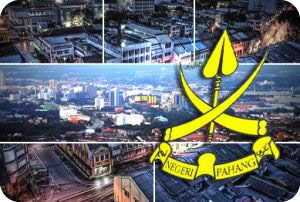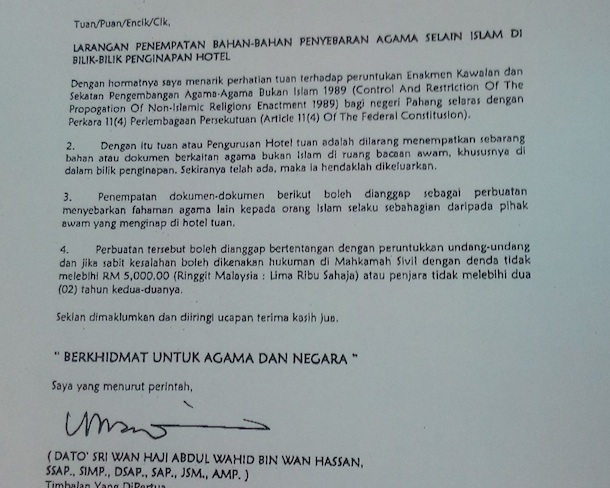Slippery slope, lawyers say of Pahang ban on holy books in <b>hotels</b> <b>...</b> - Hotel in Malaysia Blog |
| Slippery slope, lawyers say of Pahang ban on holy books in <b>hotels</b> <b>...</b> Posted: 25 Apr 2014 02:12 AM PDT (The Malay Mail) - A Pahang Islamic body's recent decision to ban hotels from carrying books on non-Islamic religions signals another step on the path towards further erosion of Malaysia liberties, said several lawyers yesterday. Raising alarm over the Pahang Islamic and Malay Customs Council (MUIP)'s move, the lawyers said failure to speak up now would see religious bodies steadily take on a bigger role in regulating the daily conduct of non-Muslims and Muslims. Lawyer Eric Paulsen said the recent ban highlights a "growing Islamisation in Malaysia and growing encroachment of Islamic authorities in the day-to-day lives of all Malaysians, whether Muslims or non-Muslims". "There is now a growing acceptance that this is an Islamic country and that Islam must have its way over non-Muslims and Islam is sacrosanct and their policies must trump all other people's rights," the co-founder of civil rights group Lawyers For Liberty (LFL) told The Malay Mail Online. He agreed that the move to officially ban non-Islamic religious materials from Pahang hotel rooms could lead to a slippery slope where more liberties are lost, claiming that both federal and state authorities appear to favour the Muslims' rights taking precedence over non-Muslims' rights. "Where does that policy stop?" he aked. Paulsen added that Pahang's Control and Restriction of the Propagation of Non-Islamic Religions Enactment 1989, which MUIP relied on for the ban, was wide and arbitrary, viewing the state law as going against the Federal Constitution's rights to freedom of speech and freedom of religion. Silence by the federal authorities over the state department's move also risks being construed as tacit approval, he added. Civil liberties lawyer Syahredzan Johan also said this was another case of state religious authorities attempting to "extend their influence on things which may not fall within their jurisdiction", saying that that both non-Muslims and Muslims alike should be concerned at this trend. Saying that the state religious bodies' actions are sending "the message that Muslims are so fragile that they need to live in a protected sphere", he objected to the increasing official regulation of Islam which he described as a personal faith. "Because we can't allow state religious authorities to define what our faith is, how we should practise it, faith is something which is personal, if we believe in something, we should be able to stick to," he told The Malay Mail Online. Syahredzan also painted a possible scenario if the Pahang ban could lead to creeping impositions on Malaysians' freedoms. "If we don't do anything or we don't say enough is enough, we won't see an end to that and the state would be a state that takes responsibility for one religion and think that religion is supposed to supercede other religion in the state. That is certainly not the case, that's not constitutional." Another civil liberties lawyer, Nizam Bashir, sought to allay non-Muslim's concern that their rights would be increasingly eroded with such Pahang authorities' move, saying that they would not be severely affected if they refrain from propagating their faith to Muslims. He pointed out that the Federal Constitution's Article 11 (4) ― a provision that enables states to make laws placing restrictions on non-Muslims, including Pahang's 1989 enactment ― was confined to attempts to spread non-Islamic religions to Muslims. But he also said allowing Muslims access to books on non-Islamic religion could even be a good thing and enhance their ability to spread their own faith, adding that Muslims were losing out with the existence of provisions in the 1989 law. "When you have provisions like that, it prevents Muslims from being able to know the bible or any non-Islamic holy books and performing dakwah (evangelism). "We won't have people like Ahmed Deedat, Shibli Zaman, Bassam Zawadi. These are all famous Muslim preachers preaching Islamic faith to non-Muslims. I think the culture of fear that we have is not a healthy one," the Syarie lawyer said. Effects on liberties aside, the lawyers also cast doubt over MUIP's jurisdiction. Nizam also said it was unclear if MUIP was the lawful authority to issue the directive in the first place and whether the ban would be applicable to hotels instead of individuals, saying that the courts would have to decide on these matters. Syahredzan insisted that MUIP only has enforcement powers under the enactment if there is propagation of other faiths to Muslims, adding that hotel operators can challenge MUIP in court on the grounds that it has "no authority" to issue and impose the prohibition. But Paulsen said that while the hotel operators could seek a judicial review of MUIP actions, he noted they may choose not to do so "in reality" out of fear that they may not be able to continue getting a business licence. On Wednesday, MUIP deputy president Datuk Seri Wan Abdul Wahid Wan Hassan said the council has issued a letter to 147 hotels in the state to prohibit them from putting any materials on non-Islamic religions in public reading places especially hotel rooms. In the March 6 letter obtained by The Malay Mail Online, MUIP said putting such materials in hotel rooms could amount to spreading other faiths to Muslims "as part of the public" residing in hotels, with such an offence punishable in the civil courts by a maximum fine of RM5,000 or a maximum two-year jail term or both. The letter cited both Article 11 (4) and the 1989 enactment, but did not state the specific provision in the 1989 state law. |
| GE lighting created a “home” atmosphere for the <b>hotel in Malaysia</b> <b>...</b> Posted: 31 Mar 2014 06:56 PM PDT GE team's goal is to create a warm and comfortable hotel environment for guests to relax in the Tune hotel.The LED tube light were installed in the elevator lobbies, hallways, bathrooms, rooms and pelmet of three stores in Malaysia. LED tube light is mainly used for ambient lighting. Compared with the original traditional fluorescent, LED tube light is known as more uniform distribution and saving more energy while the brightness meet customer requirements. GE LED tube is elegant and compact,which can bring unique soft LED lighting experience for customers. Its lifespan is 15,000 hours, significantly reducing maintenance and replacement costs. Special optical design can provide customers with a more uniform illumination. In addition,the integrated design makes installation more easy, and LED tube light with different mounting bracket is for easy multi occasions. LED tube light is widely used in a variety of stent indoor lighting environment, such as supermarkets, underground garage, home and display occasions.Browsing www.ledclan.com for more information about LED tube light. Article from http://www.lighting-ledlight.com/index.php/ge-lighting-created-a-home-atmosphere-for-the-hotel-in-malaysia/ |
| You are subscribed to email updates from Hotel in Malaysia - Google Blog Search To stop receiving these emails, you may unsubscribe now. | Email delivery powered by Google |
| Google Inc., 20 West Kinzie, Chicago IL USA 60610 | |




No comments:
Post a Comment